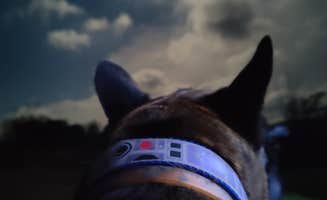Equestrian camping near Dalton, Georgia centers around the Cohutta Wilderness Management Area, which encompasses over 37,000 acres of protected forestland with elevations ranging from 700 to 4,200 feet. The region features mixed hardwood forests transitioned with pine stands, intersected by numerous coldwater streams. Winter temperatures typically drop to the mid-30s at night while summer days average 85°F with high humidity levels that can affect both horses and riders.
What to do
Trail riding on Benton McKaye Trail: The extensive trail system connects directly to Jacks River Fields Campground, allowing riders access to varied terrain. "There's a hiking trail that connects to the Benton McKaye just across from campsite and if you are bringing horses there are two paddocks for them as well," notes Liz B.
Creek exploration: Several campgrounds provide direct water access for both humans and horses. At Hickey Gap Campground, "There is a beautiful waterfall about a mile down trail from camp and tons of great swimming areas," according to John B. Exercise caution with horses at creek crossings.
Wildlife observation: The region supports diverse wildlife including deer, turkey, and various bird species. Bob P. warns, "I saw 3 copper heads at the creek" while camping at Hickey Gap, indicating the need for vigilance around water sources when with animals.
Backcountry exploration: For riders seeking more remote experiences, the 50+ miles of designated horse trails through the Cohutta Wilderness offer multi-day options. "Very beautiful, clean, awesome rangers," notes jessecah W. about nearby facilities supporting these extended rides.
What campers like
Level campsites: Finding flat terrain for horse trailers remains critical. At Cottonwood Patch Campground, Bob P. notes it has "Level spots with picnic tables. Not directly on the river but is accessible."
Seclusion options: Many riders seek quieter camping areas during weekdays. "We were the only campers around and we had an amazing time! Picked a spot right beside a stream," Sarah N. reports about her experience at Jacks River Fields Campground.
Maintained facilities: While primitive, most equestrian sites receive regular upkeep. "A pit toilet with plenty of toilet paper and it was quite clean," reports Mike H. about facilities at one wilderness campground. Basic amenities make extended stays more comfortable.
Natural water access: Streams provide both aesthetic value and practical water sources. "Peaceful sleep next to a creek," describes Mike H., highlighting the natural soundscape that many campers appreciate when horse camping in this region.
What you should know
Bear activity: Bears frequent many camping areas requiring proper precautions. "There's also a bear box and signs clearly indicating there are bears around and that you should keep all food in your vehicle or use the box," notes Mike H. about Hickey Gap, a practice essential when camping with horses that may attract wildlife.
Road conditions: Many access roads require high-clearance vehicles. "The road up there is all rock/dirt with a several hundred foot drop-off on the right side and no guardrail. There were a few hairpin turns," warns Mike H. These conditions become more challenging when towing horse trailers.
Seasonal availability: Fall and spring provide optimal conditions for horse camping. "If you come in summer when it's busy, I would recommend going to the first open field when you enter which is to the right," advises Mitchell M. about finding space during peak seasons.
Venomous snakes: Multiple species inhabit creek areas where horses often drink. "I saw 3 copper heads at the creek," cautions Bob P., reinforcing the need for awareness when watering horses.
Tips for camping with families
Safety boundaries: Establish clear zones for children around horses and water. At Gee Creek Campground, "The campground also has a playground to keep kids entertained," notes Anna M., providing supervised recreation separate from equestrian areas.
Shared responsibilities: Assign age-appropriate horse care tasks to children. "Very friendly staff. Clean facilities and nice playground," Mickey L. mentions about park facilities where families can establish routines between riding and camp maintenance.
Weather preparedness: Temperature fluctuations require flexible planning. "During winter campground is very quiet, no power at sites, it does have hot showers," Byron R. explains, highlighting the need for layered clothing even when camping with horses in shoulder seasons.
Educational opportunities: Rangers often provide junior naturalist programs at nearby facilities. "Very beautiful, clean, awesome rangers," jessecah W. notes, referencing staff who can enhance the educational experience for younger visitors.
Tips from RVers
Trailer positioning: Horse trailers with living quarters require strategic placement. At Sawmill Lake Campsite, "I came from the west and had no problems getting my 23ft camper up the mountain," reports Sierra Y., identifying the preferred approach route.
Extended stays: Some equestrian sites permit longer camping periods. "Stayed 13 days," notes Sierra Y., indicating options for those seeking extended riding experiences while based at a single campground.
Road navigation: Forest service roads often challenge larger rigs. "The east way had 180 degree sharp turns up the mountain, so may be difficult," warns Mitchell M. about access routes that require careful planning with horse trailers.
Permits required: Some wilderness areas require additional documentation. "You do need a land pass to be here, the website is on the sign coming in and it was around $60," Sierra Y. mentions, referencing requirements beyond standard camping fees.


